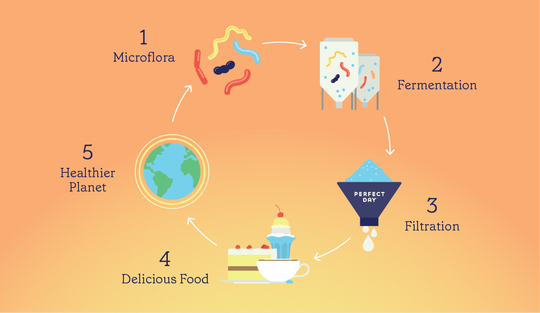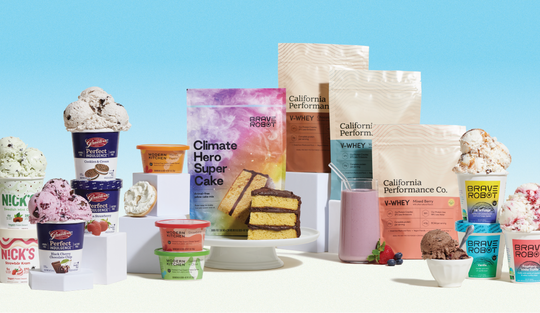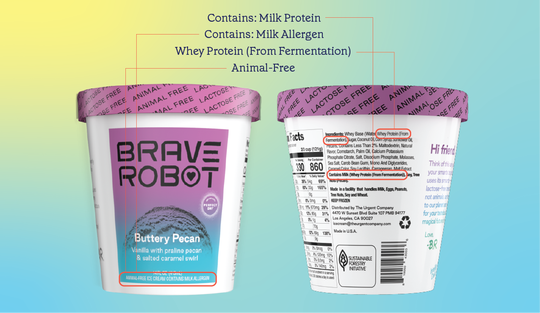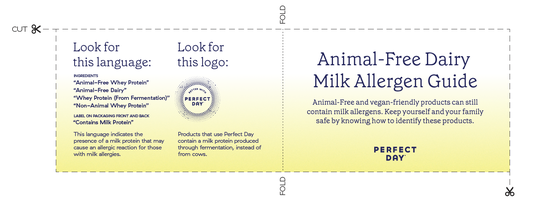Animal-Free Dairy: What To Know and How To Identify Products
Fermentation enables a new way of making dairy products that are lactose-free, sustainable, and delicious — but they can still cause an allergic reaction in those with a milk allergy. Here’s what you should know about these new dairy products.

Guest post by Kathleen Nay, Public Affairs and Content Specialist at Perfect Day
When my little brother was five years old, he ate a homemade dessert at a family reunion, and had an immediate anaphylactic reaction. The dessert contained tree nuts, which we soon learned he was severely allergic to.
Fortunately, my parents rushed him to the emergency room, and he was treated right away. But the experience changed my family’s eating behaviors permanently. From then on, every time we ate a meal away from home, it became habit to ask about ingredients and advocate on his behalf. Coming from a food allergy family, I learned from a young age how important it was to have as much information as possible about food products and ingredients, so that I could help protect my brother.
Though my brother and I are both grown and no longer eat all our meals together, I still think about food allergens often, and I bring my advocacy experience to my current role. Today I work for a company called Perfect Day, where we make animal-free dairy products. If you think “animal-free dairy” sounds like a paradox, you’re not alone! Modern food science has given us a new way to make milk proteins, in this case, whey, totally without cows, or any other animals. (More on that process later.)
Why make milk without cows? For one thing, animal-free dairy products are rich and creamy just like regular animal dairy. Products made with animal-free dairy proteins are lactose-free, which means you can enjoy them even if you’re lactose intolerant. It’s also a sustainable source of protein, generating up to 97% less greenhouse gas emissions, and requiring up to 99% less water and 60% less energy to produce!1
However, it’s important to know that if you have a milk allergy, you should avoid animal-free dairy products just like you would any other milk product. This is because animal-free dairy products contain the same allergenic proteins as are found in conventional cow’s milk, even though they’re from an animal-free source. Let’s dive in to how this is possible.
How We Make Animal-Free Milk Through Fermentation
At Perfect Day, we take inspiration from the creativity of the natural world. We’ve learned from the planet’s tiniest organisms — microflora like fungi, yeast, and bacteria — how to do incredible things like nourishing forests and helping our bodies digest food. We found a type of microflora that has a knack for making plentiful protein naturally. We gave it the precise genetic blueprint for making whey protein, which until now, could only come from animal milk, like cow’s or goat’s milk.
Next, we put the microflora in a cozy environment inside a tank with all its favorite things: sugar, water, and other nutrients. This is where it undergoes fermentation, the exact same process used to make beer fizz, yogurt thicken, and bread rise. During fermentation, our little microflora uses that genetic blueprint to consume the nutrients in the tank and make its own whey protein, the same protein that causes milk to whip, swirl, froth, and taste like milk.

After fermentation, the whey protein is separated from the microflora, filtered, purified, and dried into a powder. The final product is an extremely nutritious protein powder ready for use by food makers to make milk (or cheese, or yogurt, or ice cream…) that’s identical to the classic.
It’s the same food, just made in a different way. But importantly, because it’s the same food, it can cause the same immune response if you’re allergic to milk.
Labels To Watch for If You Have a Milk Allergy
Rather than making our own products, Perfect Day works with other food makers, helping them meet their sustainability goals by providing planet-friendly, animal-free milk ingredients. This means that animal-free milk may appear in all kinds of products under many different brand names. So how will you know if a product contains these ingredients?

Federal laws like the Food Allergen Labeling and Consumer Protection Act (FALCPA) make it easier for those with food allergies to identify allergens in food products. In accordance with FALCPA, the Top 9 Allergens must be clearly labeled so that food allergic consumers know which products to avoid.
Just like cow or other animal milk, Perfect Day’s animal-free milk protein is considered an allergen under FALCPA. Perfect Day is committed to transparency and consumer safety, and we require the same from our partners. Brands that use our animal-free milk ingredients must agree to take all three of these steps:
- Include “whey protein (from fermentation)” in the ingredients list on the product packaging; and
- Include “Contains: Milk Allergen” or “Contains: Milk Protein” beneath the ingredient list on the product’s packaging, in compliance with FALCPA; and
- Clearly indicate “Contains: Milk Allergen” or “Contains: Milk Protein” on the front of product packaging.
The third step is not required by FALCPA, but it is something Perfect Day asks all partners to do to help milk-allergic consumers avoid animal-free dairy products. We feel strongly that if you’re allergic to milk, you should be able to find an allergen label right on the front of the package.

The bottom line: If you have a milk allergy, and you see the words whey, casein, milk allergen, or milk protein — even if preceded by non-animal, animal-free, or vegan anywhere on the product’s packaging — use the same precaution as you would with any other milk product! Animal-free milk is made with milk protein (just without the cow). Even though it’s made in a new way, it poses the same risks to those with a milk allergy.
Know Before You Buy
For the first time in the history of milk consumption, we can make milk from microflora, instead of from cows! Fermentation enables us to eat nutritious, creamy, lactose- and cholesterol-free dairy products that are more sustainable than ever.
I’m proud to work for a company committed to making the world a little bit kinder and greener. And, because I grew up with a brother who has a food allergy, I also know that the more information you have about an allergenic food, the easier it is to keep yourself or your loved ones safe from an allergic reaction.
If you have a milk allergy, download our Animal-Free Dairy Milk Allergen Guide. These printable cards are a quick reference for identifying animal-free dairy products and are small enough to keep in your purse or wallet for the next time you’re at the grocery store.

If you have any food allergy, it’s always a good idea to carefully read labels. And when in doubt about ingredients at a restaurant or social gathering, ask! Being aware of allergen risks is the first step to preventing a serious reaction. At Perfect Day, our number one commitment is to consumer safety. We’ve got to look out for one another — after all, that’s what community is all about.
References
1. WSP, Inc. (2021, August 20). ISO-conformant report: Comparative life cycle assessment of Perfect Day whey protein production to dairy protein. https://m4f6w9b2.rocketcdn.me/app/uploads/2022/01/Comparative-Perfect-Day-Whey-LCA-report-prepared-by-WSP_20AUG2021_Non-Confidential-1.pdf
While FARE does not endorse products, we support and appreciate enterprises and organizations that are committed to serving the food allergy community.


